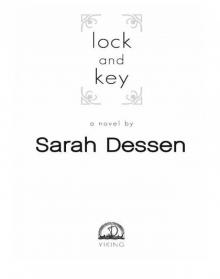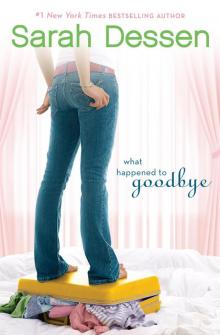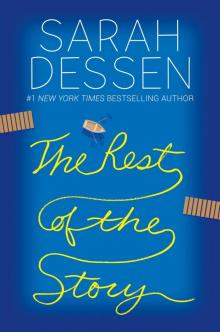- Home
- Sarah Dessen
What Happened to Goodbye Page 7
What Happened to Goodbye Read online
Page 7
“A misunderstanding,” I told him. “I’ll straighten it out.”
He nodded, and led me the rest of the way to the bar and main dining room. There, the employees were gathered around for the mandatory nightly meeting and staff meal he implemented at every restaurant. I looked for Opal, finding her at the end of the bar, taking in the plates lined up all down it, a different dish on each, with a wary look on her face.
“All right, everyone. Can I have your attention, please?” my dad said.
The group grew quieter, then silent. I watched him square his shoulders and take a breath.
“Tonight,” he began, his voice loud and confident, “we start the first phase of the reincarnation of Luna Blu. Our menu is smaller, our dishes less complicated, our ingredients fresher and more local. You will recognize some items. Others are brand-new. Now if you could just pick up a menu and read along with me, let’s start at the top.”
Opal passed out the one-page, laminated menus stacked on a nearby bar stool. As the group looked them over, there were some grunts. Some groans. One boo, although I couldn’t tell where it was coming from. It wasn’t going to be easy, this moment, or this night. But my dad had seen much worse. And as he continued, I slid into a booth just behind him, so he’d know I was there.
“Disaster.”
This was the one-word response I received the next morning when I found my dad already awake, scrambling eggs in the kitchen, and asked him how things had gone the night before. I’d tried to stay up and wait for him, but had fallen asleep around midnight when he still wasn’t home. Now I knew why.
“First new menu run is always tough,” I reminded him, pulling two plates out of the cabinet.
“This wasn’t tough,” he replied, stirring the eggs with a flick of his wrist. It was ridiculous. We were in the weeds in the first hour and never recovered, with only half the tables seated. I’ve never seen such rampant disorganization. And the attitude! It’s mind-boggling.”
I put the plates on our small kitchen table, then got some forks and napkins and sat down. “That stinks.”
“What stinks,” he said, still on a roll, “is that now I have to go back there and figure out how to fix it all before service tonight.”
I stayed quiet as he turned, sliding a generous portion of yellow, fluffy eggs onto the plate in front of me. But what I’d said was true: the first night of a new menu always went terribly, with staff members either imploding or exploding, the customers left unhappy or downright angry, and my dad deciding the whole effort was doomed. This sequence was almost required, part of the process. He never seemed to remember this from place to place, though, and reminding him was useless.
“The thing is,” he continued, dumping some eggs on the other plate before sitting down across from me, “a restaurant is only as strong as its chef. And this place has no chef.”
“What about Leo?”
“He’s the kitchen manager, although God only knows who thought he was qualified for that position. The chef quit about a week ago, after Chuckles starting asking questions about some hinky stuff his financial guys found in the books. Apparently, he did not feel like providing an explanation.”
“So you need to hire someone?”
“I would,” he said, “but no chef worth his salt would take the job with the state of the place right now. I need to implement the new menu, streamline operations, and clean house, both literally and figuratively, before I even think about bringing anyone else in.”
“That sounds easy,” I said.
“Shutting the door and cutting our losses would be the easiest,” he replied. “I’m thinking that might be the way to go.”
“Really?”
“Yep.” He sighed, then looked out the kitchen window, taking another bite. For someone who made his living out of a love of food, my dad was a fast, messy eater. He never lingered or savored, instead just wolfing down what was on his plate like someone was timing him. He was almost finished as I got up to pour myself a glass of milk, only a few bites of my own meal taken.
“Well,” I said carefully, “I guess it was bound to happen sometime.”
My dad swallowed, then glanced at me. “What was?”
“No potential,” I replied. When he raised his eyebrows, I said, “You know. A place that really can’t be fixed, even by you. A hopeless situation.”
“I guess so,” he replied, wiping his mouth with a napkin. “Some things can’t be saved.”
This was a fact we both knew well. And maybe that wouldn’t be such a bad thing, I thought as I opened the fridge, letting this ship sink. Sure, it would mean another move, another change, another school. But at least I’d get to start right, not like I had here, where I was stuck with Mclean, despite my best—
“The thing is,” he sd suddenly, interrupting this quickly snowballing train of thought, “there is some good talent in the kitchen.”
If I’d been paying closer attention, I probably would have heard it, the sound of the bottom getting hit. Followed by the beginning of this small rise.
“Not Leo, obviously,” he continued, glancing at me. “But a couple of the line guys, and one of the prep cooks. And there are possibilities on the floor as well, if I can just weed out the gloom-and-doomers.”
I slid back into my seat, putting my glass in front of me. “How did the customers like the new menu?”
“The few we had, who actually got their meals hot and complete,” he said with a sigh, “were raving.”
“And the pickles?”
“Went over huge. Opal was furious.” He smiled, shaking his head. “But the new menu, it’s good. Simple, flavorful, plays to all our strengths. The few we have anyway.”
Now I was sure he was going to stay in. This, when he went from using “them” to “us”—an outsider to one within—was another sign.
His phone, parked by the sink, suddenly jumped and buzzed. He reached over, grabbing it and flipping it open. “Gus Sweet. Oh, right. I did want to talk to you. . . .”
As a voice crackled from the other line, I glanced over at our neighbors’ house, just in time to see Dave Wade’s mom coming out her side door. She was dressed in jeans, a white, cable-knit sweater, and sensible shoes, a tote bag over one shoulder, carrying a foil-covered pan in her hands. As she walked down the steps, she moved carefully, looking down so she wouldn’t trip.
“. . . Yes, that’s exactly what I said,” my dad was saying as she crossed the driveway and started up our steps, equally cautiously. “Why? Because I don’t like the look of the order I got yesterday.”
Mrs. Wade was almost to our side door. I got up to meet her, just as she leaned into the screen, covering her eyes with her free hand. When she saw me, she jumped back, startled.
“Hello,” she said as I pushed the door open. “I’m Anne Dobson-Wade. I live next door? I wanted to welcome you to the neighborhood, so I made some brownies.”
“Oh,” I said. She extended the dish to me, and I took it. “Thank you.”
“They are nut-free, gluten-free, and sugar-free, made with all organic ingredients,” she said. “I didn’t know if you had any allergies.”
“We don’t,” I replied. “But, um, thanks for the consideration.”
“Of course!” She smiled at me, a bit of frizz blowing in the wind coming in behind her. “Well, as I said, we are right next door. If you need anything or have questions about the neighborhood, I hope you’ll let us know. We’ve been here forever.”
I nodded in response to this, just as Dave came out of her door, wearing a green T-shirt and jeans, and began dragging the garbage can down to the curb. His mom turned, saying something to him, but he didn’t hear her over the wheels scraping the pavement, and kept walking. Then my dad started yelling.
“I don’t care if you’v been supplying them for a hundred years. Don’t run a muddle on me. I can tell a light order when I see it.” He paused, allowing the other person, who was now talking even more quickly, to say something. “Look.
This isn’t up for debate, okay?”
Mrs. Dobson-Wade looked at my dad, clearly alarmed at his tone. “It’s a work call,” I explained, as behind her, Dave came back up the driveway. When he saw me talking to his mom, he slowed his steps, then stopped entirely.
“Who am I?” my dad said was saying as Dave Wade and I, strangers but not, just stared at each other over his mother’s small, bony shoulder. “I’m the new boss at Luna Blu. And you are my former produce purveyor. Goodbye.”
He hung up, then slammed his phone down for emphasis on the table, the sound making me jump. Only then did he look up and see me and Dave’s mom at the door.
“This is Mrs. Dobson-Wade,” I said, keeping my own voice calm, as if to prove we weren’t both total maniacs. “She made us some brownies.”
“Oh.” He wiped his hands together, then came over. “That’s . . . Thank you.”
“You’re very welcome!” There was an awkward beat, with no one talking, before she said, “I was just telling your daughter that we’ve lived here for over twenty years, so if you need any information on the neighborhood, or schools, just let us know.”
“I’ll do that,” my dad said. “Although this one’s already gotten herself settled in pretty well, from what I can tell.”
“You’re at Jackson?” Mrs. Dobson-Wade asked me. I nodded. “It’s a fine public school. But there are other options if you wanted to explore them, in the private sector. Exemplary ones, actually.”
“You don’t say,” my dad replied.
“Our son was at one of them, Kiffney-Brown, until last year. He decided to transfer, not that we were very happy about it.” She sighed, shaking her head. “You know teenagers. So difficult when they decide they have a mind of their own.”
I felt my dad look at me, but this time I kept my gaze straight ahead. I wasn’t about to field this one. “Well,” he said finally. “I suppose . . . that is true, sometimes.”
Mrs. Dobson-Wade smiled, as if he’d offered more agreement than he had. “Did I hear you say you’re the new chef at Luna Blu?”
“More like the interim,” my dad said.
“Oh, we love Luna Blu,” she told him. “The rolls are amazing !”
My dad smiled. “Well,” he said, “next time you come in, ask for me. I’ll make sure you’re taken care of. I’m Gus.”
“Anne,” she said. She glanced behind her, seeing Dave, who was just standing there still looking at me, having not come any closer. “My husband, Brian, will be along in a moment, and that’s my son, David. David, this is Gus and—”
Everyone looked at me. “Mclean,” I said.
Dave raised a hand in a wave, friendly, but still kept his distance. I thought of what Heather and Riley had told me: boy genius, smoothie maker, cellar dweller. Right now, I thought, he didn’t look like any of the people they’d described, which was unsettling in a way that was entirely too familiar.
The side door banged again, and Mr. Wade finally came out. He was tall and reedy, with a beard, and carried a messenger bag, which he strapped across himself as he came down the stairs. In his other hand was a bike helmet covered in reflector stickers.
“Brian!” Mrs. Wade called out. “Say hello to our new neighbors.”
Mr. Wade came over cheerfully, a smile on his face, and joined our little confab on the deck. Standing together, he and Anne looked like a matched set of rumpled academics in their thick glasses, he with his helmet, she with her NPR tote bag over one shoulder. “Nice to meet you,” he said, shaking my hand and then my dad’s. “Welcome to the burg.”
“Thanks,” my dad said.
“Gus is the interim chef at Luna Blu,” Anne informed him.
“Oh, we love Luna Blu!” Brian said. “Those rolls! They’re the perfect dinner on a cold night.”
I bit my lip, making a point of not looking at my dad as we all just stood there, smiling at each other. Meanwhile, behind them, Dave gave me a look that was hard to read—almost apologetic—and walked back to the house, going inside. The sound of the door swinging shut behind him was like a whistle being blown to end a huddle. With it, we all broke.
“I’ve got to run to the lab,” Dave’s mom said, stepping back from the door. Brian smiled, following her as he put on his helmet. “Please let us know if we can be of any help as you get settled.”
“We’ll do that,” my dad said. “Thanks again for the brownies.”
They waved, we waved. Then we stood there, silent, watching them as they went down the deck stairs, back to their driveway. Under the basketball goal, they stopped, and Brian leaned down so Anne could give him a peck on the cheek. Then she went to her car, and he to his bike, which was chained to their front deck. He wheeled it down the driveway, she backed out, and at the road, he went left, she right.
“Well,” my dad said after a moment. “They sure do like those rolls, huh?”
“No kidding.” I lifted up the pan she’d given me, taking a hesitant whiff. “Can brownies actually be sugar-, gluten-, and nut-free and still be good?”
“Let’s find out,” he said, lifting the Saran Wrap covering it. He reached in, took one, and stuck the entire thing in his mouth, devouring it. After chewing for what seemed like a long time, he finally swallowed. “Nope.”
Point taken. I put the pan down. “Everything okay on the produce front? It sounded kind of intense.”
“That guy is an idiot,” my dad grumbled, getting up to slide his breakfast plate into the sink. “Not to mention a thief. Maybe now I’ll get some decent vegetables. Shoot, that reminds me, I set up a meeting at the farmers’ market in ten minutes. You going to be okay here?”
“Yeah,” I said. “Absolutely.”
As he picked up his phone and left the room, I looked back at Dave’s house. His parents seemed nice enough, hardly the strict Gulag types Heather had described. But then again, as Riley ha said, no one was really normal, and you couldn’t tell a thing from the outside anyway. One thing, however, was clear: there was no escaping Mclean now. I was her, I was here, and it looked like we’d be sticking around. Nothing left to do but bail, and rise.
Four
“Hello?”
“It’s me,” my mother said. “Don’t hang up.”
I knew it had been a bad idea to answer without looking at the caller ID. Normally, I was vigilant about such things, but in the crush of the pre-homeroom main hallway, I’d let down my guard.
“Mom, I can’t talk right now,” I said, as someone with a huge backpack bumped me sideways from behind.
“You always say that, no matter what time I call,” she replied. “Surely you can spare a moment or two.”
“I’m at school,” I said. “My next class starts in five minutes.”
“Then give me four.” I rolled my eyes, annoyed, and as if she could see this, she added, “Please, Mclean. I miss you.”
And there it was, the tiniest twinge, like that tickle in your throat right before the tears begin. It was amazing to me that she could always find my tender spot, the one I was never even able to pinpoint myself. It was like she’d had it built into me somehow, the way scientists in sci-fi movies always put a secret button to deactivate the robot if it goes crazy and turns on them. Because you just never know.
“Mom,” I said, ducking out of the main hall and down a side alcove, where I was pretty sure my locker was supposed to be, “I told you. I just need a little time.”
“It’s been two weeks!” she protested. “How long are you planning to stay upset with me?”
“I’m not planning anything. I just . . .” I sighed, so sick of trying to explain why I needed space from her. It was constantly under negotiation, her trying to yank me closer, me straining to pull back. Even with hundreds of miles between us I still felt under her thumb. “I need a break.”
“From me,” she said, clarifying.
“From all this. I’m in a new place, and new school. . . .”
“Only because you want to be,” she reminded me. “If it w
as up to me, you’d still be here, enjoying all the perks of your senior year with the friends you’ve known forever.”
“Yes,” I said, “but it’s not up to you.”
She exhaled loudly, the sound like a wave breaking into my ear. This was the bottom line, the main issue, the thing we always came back to, no matter how much circling we did before or after. My mother wanted control over me and I wouldn’t give it to her. It made her crazy, so she in turn made me crazy. And repeat.
It reminded me of when I was little, and my grandparents had a cat named Louis Armstrong. My parents were too busy with the restaurant to deal with pets, and as a result I was crazy for any animal I could get my hands on. Louis, however, was old and mean and had absolutely no interest in children, diving under the couch the minute he heard me coming. Undaunted, I’d sit on the carpet under the side table and try to get him to emerge: calling his name, offering treats, once even reaching under and attempting to pull him out, only to receive full-arm scratches in return.
After that, I pretty much gave up, electing to spending my time at my grandparents’ watching TV on their old set, which got only three channels. Then, one day, the weirdest thing happened. I was sitting there, watching some cloudy, old movie while the adults talked in the next room, and I felt something brush against my leg. Looking down, I was shocked to see Louis Armstrong, elusive no more, passing by and giving me a little flick of his tail. Sure, it wasn’t the all-out adoration I’d craved. But it was something. And I never would have gotten it—or the slow build to almost-affection that followed in the next few months—if I hadn’t just left him alone.
I had tried to explain this to my mother. I’d even referred to the cat. But she just didn’t get it, or chose not to. Forget cats and couches. I was her daughter, I belonged to her. I was supposed to cooperate.
This latest standoff, only a couple of weeks old, had a familiar impetus. She’d called a day or two before we’d left Westcott, as I was busy packing things up. I made the mistake of telling her this, and she went ballistic.

 Just Listen
Just Listen Along for the Ride
Along for the Ride This Lullaby
This Lullaby Once and for All
Once and for All Lock and Key
Lock and Key The Truth About Forever
The Truth About Forever Someone Like You
Someone Like You What Happened to Goodbye
What Happened to Goodbye Dreamland
Dreamland Keeping the Moon
Keeping the Moon The Rest of the Story
The Rest of the Story The Moon and More
The Moon and More What Happens to Goodbye
What Happens to Goodbye